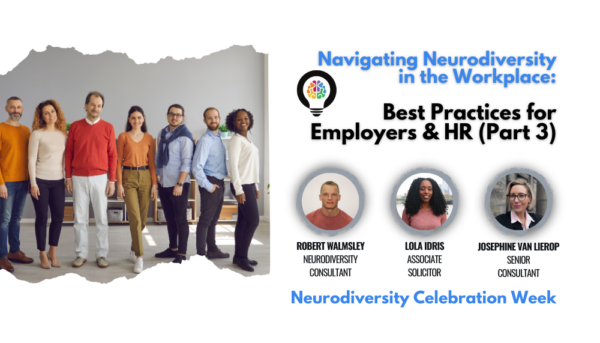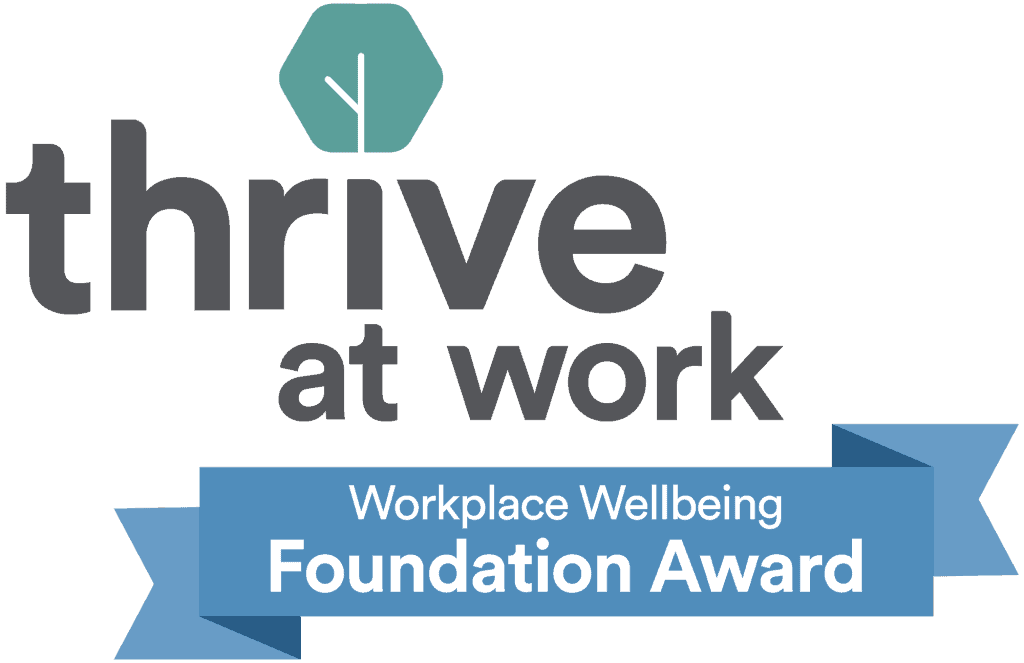Article Three: Best Practices and Resources
This final instalment in our neurodiversity series focuses on practical strategies and resources that employers can implement to build inclusive workplaces and to attract and empower neurodivergent employees. Previously, in articles 1 and 2[LI1] we defined neurodiversity and explored relevant employment law legislation applicable to neurodiversity.
On 20 February 2024, the CIPD published a report on neuroinclusion at work. The report found that:
- while neuroinclusion was a focus for 60% of surveyed employers, it was only in the Diversity, Equity and Inclusion strategy of 33%.
- just over half (53%) of employees surveyed felt their organisation had an open and supportive climate where employees could talk about neurodiversity;
- only 38% said their organisation provided meaningful support to neurodivergent staff;
- 20% of neurodivergent employees had experienced harassment or discrimination at work because of their neurodivergence; and
- 30% of employers had carried out education and awareness-raising about neurodiversity.
To tackle these statistics and ensure that employers better support their neurodivergent employees, the Chartered Institute of Personnel and Development (CIPD) published a guide on how to develop neuroinclusion at work https://www.cipd.org/en/knowledge/guides/neuroinclusion-work/.
The guide essentially sets out seven key principles for creating a neuroinclusive organisation:
- understanding where the organisation currently is in terms of its approach, policies and processes related to neurodiversity and committing to a long-term plan;
- focusing on creating an open and supportive culture;
- proactively considering neurodiversity in all people management interactions;
- allowing individual employees to be masters of their own journey;
- embracing flexible working;
- practicing ongoing attention to wellbeing; and
- empowering neurodivergent voices within the workforce.
Below are further details of how employers can practically support neurodivergent employees and ensure their process, policies and systems accommodate and allow neurodivergent employees to feel supported, confident and able to thrive at work.
- Implementing practical solutions
- Considering office design and making appropriate changes where possible e.g. incorporating sensory-friendly design, providing flexible workstations, creating calm zones, considering thoughtful use of colours and materials etc.;
- Embracing flexible working and ensuring that flexibility is provided in terms of how, when and where work gets done;
- As mentioned in article 2[LI2] of these series, employers should consider and provide “reasonable adjustments” where necessary (e.g. flexible schedules, supportive technology, workspace modifications);
- Proactively catering for different preferences in communication, instructions and meetings. Implementing communication adjustments can include but is not limited to using:
- Offering multiple formats – offering written materials, visual aids and/or verbal explanations;
- Simplifying explanations – avoiding jargon and providing explanations things in bite-sized chunks; and
- Asynchronous communication: Giving time for employees to process and respond instructions.
- Creating a culture of psychological safety, where people feel able to ask for support and recognising that needs are different even among people sharing the same neurodivergent identity; and
- Enabling open disclosure and celebrating neurodivergent successes so that neurodivergent employees feel able to have open dialogue within the workspace, employers should of course also be understanding towards and respect neurodivergent employees who do not feel comfortable sharing their neurodivergence with others.
In our experience, employers who don’t encourage transparency and a platform to discuss these issues are the ones who stumble in their legal obligations. Employers that don’t understand what can often be a “hidden disability” fail to act to avoid discrimination in regards to their policies and practices and also fail to provide reasonable adjustments their neurodivergent staff might need.
- Educating the workforce
The CIPD guide includes working definitions (that may be subject to change over time) of relevant terminology, such as “neurodivergent” and “neurotypical”; and recommends engaging with employees over the language to be used.
For example, “neurodiversity” is defined as the natural variation in human brain functioning and “neuroinclusion” is defined as inclusion of neurodiversity by “consciously and actively including all types of information processing, learning and communication styles”. More on this is covered in article one if you want to refer back[LI3] .
Encouraging employees to use this terminology fosters an environment and culture of inclusivity and respecting differences. Taking the time and care to understand and consider neurodivergent terms helps to dispel myths and encourages open dialogue within the workplace.
- Attracting Neurodivergent Talent:
Employers should also consider neurodiversity of prospective employees, particularly in terms of their recruitment and promotion processes. A best practice approach is to provide neuroinclusive interview training for hiring managers and promotional boards ensuring that there is a degree of flexibility with assessment methods to accommodate for neurodivergent applicants.
Some practical ways that employers can ensure their employment recruitment processes are accessible to neurodivergent applicants are set out below:
- Consider alternative application formats and flexible interview options e.g. pre-shared interview questions, work trials, and a designated point of contact throughout recruitment.
- Ensure that all applications highlight that support can be provided and adjustments made if necessary.
- Be mindful that neurodivergent employees may still be in the process of obtaining a formal diagnosis and allowing applicants to disclose to the extent that they personally feel comfortable.
Support and Training:
Employers should also develop a neuroinclusive culture by raising awareness of neurodiversity through training.
HR, Diversity, Equity and Inclusion specialists, senior leaders, and managers should champion and facilitate action on neuroinclusion, and influence workers to create a neuroinclusive workplace. In order to so, individuals within these roles must be trained.
In terms of specific training for employees, the types of support and training offered can include:
- Pairing a neurodivergent employee with a mentor or buddy;
- Understanding and share information about the Access to Work Grant;
- Offering peer support groups;
- Considering executive function training; and
- Actively involving neurodivergent employees in process and training design.
There are a range of physical tools such as desktop assessments, provision of software and technology that also can be of huge assistance to neurodivergent staff.
Conclusion:
Employers should be pro-actively making an effort to ensure that they have in place practical and measurable strategies and resources to foster a neuro-affirming workplace culture. Setting targets and carrying out periodic reviews of policies and systems in place will allow employers to identify areas of strength and areas that need to be improved. Employers should look to collaborate with Diversity. Equity and Inclusion specialists and neurodivergent individuals to develop existing diversity, equity and inclusion policies and strategies.
Employers should be mindful that providing support for neurodivergent employees already in the workforce is only part of their responsibility, support should start early on by adopting inclusive hiring practices and supporting prospective employees too.
Lastly, employers should appreciate that neurodivergent individuals exist on a spectrum, from those with expert understanding to those still exploring their needs, therefore support should be adaptable, flexible and tailored.
If you would like more information on how best to support neurodivergent employees, feel free to get in touch with the team. Jones Chase is a specialist employment law firm based in the centre of London with an excellent track record of looking after those that we assist. Do contact us should you require further information or need any assistance. We are always happy to speak to people and point them in the right direction – all information can be found on our website, JonesChase.com
Useful Resources
- Equality Act 2010,
- Reasonable Adjustments,
- Access to Work Grant
- https://www.cipd.org/en/knowledge/guides/neuroinclusion-work/
- Robert Walmsley – [email protected] / 07828901443
- Lola Idris, Associate – [email protected] / 07748 022908
- Josephine van Lierop, Senior Consultant – [email protected]





